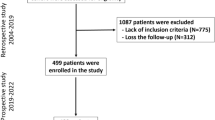Abstract
Objective
The aim of this retrospective study is to compare the results of starting rheumatoid arthritis (RA) treatment with tight control strategy in the window of opportunity and later phases of the disease in real-world clinical practice.
Methods
In this cohort, 609 RA patients were divided into three groups: (i) very early treatment (VET): ≤ 3 months; (ii) early treatment (ET): 3–12 months; and (iii) late treatment (LT) > 12 months after the onset of the disease. Four levels of remission were defined: (i) sustained remission on treatment, (ii) sustained glucocorticoids free remission, (iii) sustained disease-modifying anti-rheumatic drugs (DMARDs) free remission, and (iv) long-term remission. Outcome was assessed based on the number of patients in sustained or long-term remission and patients with poor joint outcome and systemic involvement.
Results
There were no significant differences in the remission rate between the groups. Time to sustained remission in VET group was shorter than ET and LT groups. There were no significant differences in the rate and duration of prednisolone discontinuation in the studied groups. DMARDs were discontinued in VET, ET, and LT groups in 8.7%, 10.2%, and 7% of the patients, respectively. Poor joint outcome occurred in 33.2%, 50.5%, and 59.4% of the patients in the VET, ET, and LT groups, respectively. Remission induction in the first year of the treatment was associated with long-term remission in the VET, ET, and LT groups.
Conclusions
Medications free remission in RA is rare, and although treatment with DMARDs within 3 months of the onset of the disease can prevent joint damage, it cannot lead to long-term remission and discontinuation of medications.
Key Points
• Medications free remission in rheumatoid arthritis is rare.
• Treatment with DMARDs within 3 months of the onset of the disease can prevent joint damage, but it cannot lead to long-term remission and discontinuation of medications.

Similar content being viewed by others
References
Smolen JS, Aletaha D, Bijlsma JW, Breedveld FC, Boumpas D, Burmester G et al (2010) Treating rheumatoid arthritis to target: recommendations of an international task force. Ann Rheum Dis 69:631–637
Smolen JS, Landewé R, Bijlsma J, Burmester G, Chatzidionysiou K, Dougados M et al (2017) EULAR recommendations for the management of rheumatoid arthritis with synthetic and biological disease-modifying antirheumatic drugs: 2016 update. Ann Rheum Dis 76:96077
Quinn MA, Emery P (2003) Window of opportunity in early rheumatoid arthritis: possibility of altering the disease process with early intervention. Clin Exp Rheumatol 21:S154–S157
Boers M (2003) Understanding the window of opportunity concept in early rheumatoid arthritis. Arthritis Rheum 48:1771–1774
Raza K, Saber TP, Kvien TK, Tak PP, Gerlag DM (2012) Timing the therapeutic window of opportunity in early rheumatoid arthritis: proposal for definitions of disease duration in clinical trials. Ann Rheum Dis 71:1921–1923
Sokka T, Hetland ML, Mäkinen H, Kautiainen H, Hørslev-Petersen K, Luukkainen RK et al (2008) Remission and rheumatoid arthritis: data on patients receiving usual care in twenty-four countries. Arthritis Rheum 58:2642–2651
Chandrashekara S, Shobha V, Dharmanand BG, Jois R, Kumar S, Mahendranath KM et al (2018) Factors influencing remission in rheumatoid arthritis patients: results from Karnataka rheumatoid arthritis comorbidity (KRAC) study. Int J Rheum Dis 21:1977–1985
Kievit W, Fransen J, Oerlemans AJ, Kuper HH, van der Laar MA, de Rooij DJ et al (2007) The efficacy of anti-TNF in rheumatoid arthritis, a comparison between randomised controlled trials and clinical practice. Ann Rheum Dis 66:1473–1478
Felson DT, Smolen JS, Wells G, Zhang B, van Tuyl LH, Funovits J et al (2011) American College of Rheumatology/European League Against Rheumatism Provisional Definition of Remission in Rheumatoid Arthritis for Clinical Trials. Ann Rheum Dis 70:40413
Prasanna Misra D, Agarwal V (2019) Real-world evidence in rheumatic diseases: relevance and lessons learnt. Rheumatol Int 39:403–416
Burgers LE, Raza K, Helm-van Mil AH (2019) Window of opportunity in rheumatoid arthritis – definitions and supporting evidence: from old to new perspectives. RMD Open 5:e000870
van Aken J, Heimans L, Gillet-van Dongen H, Visser K, Ronday HK, Speyer I et al (2014) Five-year outcomes of probable rheumatoid arthritis treated with methotrexate or placebo during the first year (the PROMPT study). Ann Rheum Dis 73:396–400
Emery P, Durez P, Dougados M, Legerton CW, Becker JC, Vratsanos G et al (2010) Impact of T-cell costimulation modulation in patients with undifferentiated inflammatory arthritis or very early rheumatoid arthritis: a clinical and imaging study of abatacept (the ADJUST trial). Ann Rheum Dis 69:510–516
Bergstra SA, Van Der Pol JA, Riyazi N, Goekoop-Ruiterman YPM, Kerstens PJSM, Lems W et al (2020) Earlier is better when treating rheumatoid arthritis: but can we detect a window of opportunity? RMD Open 6:e001242
Acknowledgements
The authors thank all the patients for participating in this study.
Author information
Authors and Affiliations
Contributions
AS, AKH, and AMM designed the study; SE, AS, KE, AKH, and MH were involved in the data acquisition and/or management; AKH and AMM analyzed the data and critically interpreted the results; SE, AMM, and AKH were involved in drafting the manuscript. All authors revised the manuscript critically for important intellectual content and approved the final manuscript.
Corresponding author
Ethics declarations
Disclosures
None.
Additional information
Publisher’s note
Springer Nature remains neutral with regard to jurisdictional claims in published maps and institutional affiliations.
Rights and permissions
About this article
Cite this article
Ebrahimian, S., Salami, A., Malek Mahdavi, A. et al. Can treating rheumatoid arthritis with disease-modifying anti-rheumatic drugs at the window of opportunity with tight control strategy lead to long-term remission and medications free remission in real-world clinical practice? A cohort study . Clin Rheumatol 40, 4485–4491 (2021). https://doi.org/10.1007/s10067-021-05831-3
Received:
Revised:
Accepted:
Published:
Issue Date:
DOI: https://doi.org/10.1007/s10067-021-05831-3



